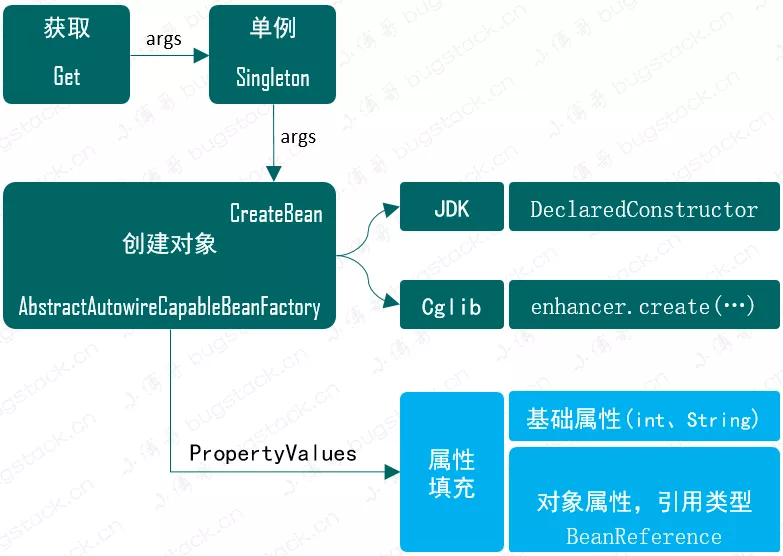目标
首先我们回顾下这几章节都完成了什么,包括:实现一个容器、定义和注册Bean、实例化Bean,按照是否包含构造函数实现不同的实例化策略,那么在创建对象实例化这我们还缺少什么?其实还缺少一个关于类中是否有属性的问题,如果有类中包含属性那么在实例化的时候就需要把属性信息填充上,这样才是一个完整的对象创建。
设计
鉴于属性填充是在 Bean 使用 newInstance 或者 Cglib 创建后,开始补全属性信息,那么就可以在类 AbstractAutowireCapableBeanFactory 的 createBean 方法中添加补全属性方法。

- 属性填充要在类实例化创建之后,也就是需要在 AbstractAutowireCapableBeanFactory 的 createBean方法中添加 applyPropertyValues 操作。
- 由于我们需要在创建Bean时候填充属性操作,那么就需要在 bean 定义 BeanDefinition 类中,添加PropertyValues 信息。
- 另外是填充属性信息还包括了 Bean 的对象类型,也就是需要再定义一个 BeanReference,里面其实就是一个简单的 Bean名称,在具体的实例化操作时进行递归创建和填充,与 Spring 源码实现一样。Spring 源码中 BeanReference 是一个接口!!!
实现
本章节中需要新增加3个类,BeanReference(类引用)、PropertyValue(属性值)、PropertyValues(属性集合),分别用于类和其他类型属性填充操作。另外改动的类主要是AbstractAutowireCapableBeanFactory,在 createBean 中补全属性填充部分。
定义属性
package com.qingyun.springframework.beans.factory;
/**
* @description: bean实例中的一个属性
* @author: 張青云
* @create: 2021-08-18 23:47
**/
public class PropertyValue {
private final String name;
private final Object value;
public PropertyValue(String name, Object value) {
this.name = name;
this.value = value;
}
public String getName() {
return name;
}
public Object getValue() {
return value;
}
}
package com.qingyun.springframework.beans.factory;
import java.util.ArrayList;
import java.util.List;
/**
* @description: 一个bean对象中全部属性的集合
* @author: 張青云
* @create: 2021-08-18 23:48
**/
public class PropertyValues {
// 用来保存属性
private final List<PropertyValue> propertyValueList = new ArrayList<>();
public void addPropertyValue(PropertyValue pv) {
this.propertyValueList.add(pv);
}
public PropertyValue[] getPropertyValues() {
return this.propertyValueList.toArray(new PropertyValue[0]); // list的toArray方法需要传入一个数组来指定类型
}
public PropertyValue getPropertyValue(String propertyName) {
for (PropertyValue pv : this.propertyValueList) {
if (pv.getName().equals(propertyName)) {
return pv;
}
}
return null;
}
}
这两个类的作用就是创建出一个用于传递类中属性信息的类,因为属性可能会有很多,所以还需要定义一个集合包装下。
Bean定义补全
package com.qingyun.springframework.beans.factory.config;
import com.qingyun.springframework.beans.factory.PropertyValues;
/**
* @description: Bean的定义信息,对应于spring源码中解析xml文件后获取到的Bean定义信息
* @author: 張青云
* @create: 2021-08-18 16:52
**/
public class BeanDefinition {
// bean的类型
private Class beanClass;
// bean的属性信息
private PropertyValues propertyValues;
public BeanDefinition(Class beanClass) {
this.beanClass = beanClass;
}
public BeanDefinition(Class beanClass, PropertyValues propertyValues) {
this.beanClass = beanClass;
this.propertyValues = propertyValues != null ? propertyValues : new PropertyValues();
}
public Class getBeanClass() {
return beanClass;
}
public PropertyValues getPropertyValues() {
return propertyValues;
}
}
在 Bean 注册的过程中是需要传递 Bean 的信息,在几个前面章节的测试中都有所体现 new BeanDefinition(UserService.class, propertyValues);所以为了把属性一定交给 Bean 定义,所以这里填充了 PropertyValues 属性,同时把两个构造函数做了一些简单的优化,避免后面 for 循环时还得判断属性填充是否为空。
Bean 属性填充
package com.qingyun.springframework.beans.factory.support;
import cn.hutool.core.bean.BeanUtil;
import com.qingyun.springframework.beans.BeansException;
import com.qingyun.springframework.beans.factory.PropertyValue;
import com.qingyun.springframework.beans.factory.PropertyValues;
import com.qingyun.springframework.beans.factory.config.BeanDefinition;
import com.qingyun.springframework.beans.factory.config.BeanReference;
import java.lang.reflect.Constructor;
/**
* @description: 实现了根据BeanDefinition去创建bean的能力
* @author: 張青云
* @create: 2021-08-18 18:29
**/
public abstract class AbstractAutowireCapableBeanFactory extends AbstractBeanFactory{
// 指定实例化方式的策略,默认使用JDK反射的方式
private InstantiationStrategy instantiation = new SimpleInstantiationStrategy();
@Override
protected Object createBean(String beanName, BeanDefinition beanDefinition, Object[] args) throws BeansException {
Object bean = null;
try {
// 实例化bean
bean = createBeanInstance(beanDefinition, beanName, args);
// 对bean对象进行属性填充
if (beanDefinition.getPropertyValues() != null &&
beanDefinition.getPropertyValues().getPropertyValues().length != 0) {
applyPropertyValues(beanName, bean, beanDefinition);
}
} catch (Exception e) {
throw new BeansException("Instantiation of bean failed", e);
}
return bean;
}
/**
* 创建bean实例
*/
protected Object createBeanInstance(BeanDefinition beanDefinition, String beanName, Object[] args) {
Constructor usedConstructor = null;
Constructor[] constructors = beanDefinition.getBeanClass().getDeclaredConstructors();
for (Constructor ctor: constructors) {
if (args != null && ctor.getParameterTypes().length == args.length) {
Class[] parameterTypes = ctor.getParameterTypes();
for (int i = 0; i < parameterTypes.length; i++) {
if (parameterTypes[i] != args[i].getClass()) {
break;
}
}
usedConstructor = ctor;
break;
}
}
return instantiation.instantiate(beanName, beanDefinition, usedConstructor, args);
}
/**
* 属性填充
*/
protected void applyPropertyValues(String beanName, Object bean, BeanDefinition beanDefinition) {
try {
PropertyValues propertyValues = beanDefinition.getPropertyValues();
for (PropertyValue propertyValue: propertyValues.getPropertyValues()) {
String name = propertyValue.getName();
Object value = propertyValue.getValue();
if (value instanceof BeanReference) {
// TODO 没有解决循环依赖问题
// A 依赖 B,获取 B 的实例
BeanReference beanReference = (BeanReference) value;
value = getBean(beanReference.getBeanName());
}
// 属性填充
BeanUtil.setFieldValue(bean, name, value);
}
} catch (Exception e) {
throw new BeansException("Error setting property values:" + beanName);
}
}
public void setInstantiation(InstantiationStrategy instantiation) {
this.instantiation = instantiation;
}
}
这个类的内容稍微有点长,主要包括三个方法:createBean、createBeanInstance、applyPropertyValues,这里我们主要关注 createBean 的方法中调用的 applyPropertyValues 方法。
在 applyPropertyValues 中,通过获取 beanDefinition.getPropertyValues() 并循环进行属性填充操作,如果遇到的是 BeanReference,那么就需要递归获取 Bean 实例,调用 getBean 方法。
当把依赖的 Bean 对象创建完成后,会递归回现在属性填充中。BeanUtil.setFieldValue(bean, name, value) 是 hutool-all 工具类中的方法,你也可以自己实现!这里需要注意我们并没有去处理循环依赖的问题,这部分内容较大,后续补充。
测试
事先准备
package com.qingyun.springframework.beansTest;
import java.util.HashMap;
import java.util.Map;
/**
* @description:
* @author: 張青云
* @create: 2021-08-19 00:13
**/
public class UserDao {
private static Map<String, String> hashMap = new HashMap<>();
static {
hashMap.put("10001", "小傅哥");
hashMap.put("10002", "八杯水");
hashMap.put("10003", "阿毛");
}
public String queryUserName(String uId) {
return hashMap.get(uId);
}
}
package com.qingyun.springframework.beansTest;
/**
* @description:
* @author: 張青云
* @create: 2021-08-18 22:54
**/
public class UserService {
private String uId;
private UserDao userDao;
public UserService() {
}
public void queryUserInfo() {
System.out.println("查询用户信息:" + userDao.queryUserName(uId));
}
}
测试用例
public void beanTest3() {
// 1.初始化 BeanFactory
DefaultListableBeanFactory beanFactory = new DefaultListableBeanFactory();
// 2. UserDao 注册
beanFactory.registerBeanDefinition("userDao", new BeanDefinition(UserDao.class));
// 3. UserService 设置属性[uId、userDao]
PropertyValues propertyValues = new PropertyValues();
propertyValues.addPropertyValue(new PropertyValue("uId", "10001"));
propertyValues.addPropertyValue(new PropertyValue("userDao",new BeanReference("userDao")));
// 4. UserService 注入bean
BeanDefinition beanDefinition = new BeanDefinition(UserService.class, propertyValues);
beanFactory.registerBeanDefinition("userService", beanDefinition);
// 5. UserService 获取bean
UserService userService = (UserService) beanFactory.getBean("userService");
userService.queryUserInfo();
}
项目代码Github地址:https://github.com/Zhang-Qing-Yun/mini-spring,本节代码对应的commit标识为44c2179欢迎标星
最后
以上就是搞怪烧鹅最近收集整理的关于手写简易版Spring框架(三):属性填充目标设计实现测试的全部内容,更多相关手写简易版Spring框架(三)内容请搜索靠谱客的其他文章。








发表评论 取消回复